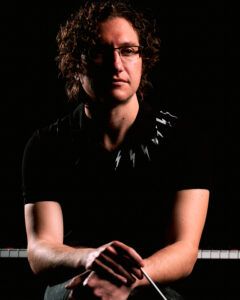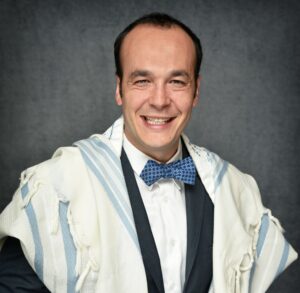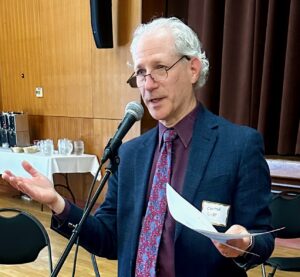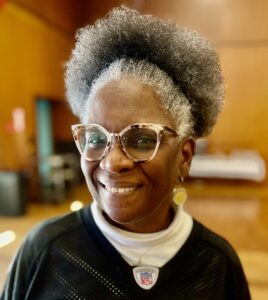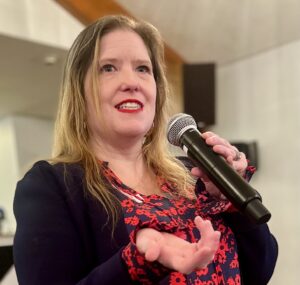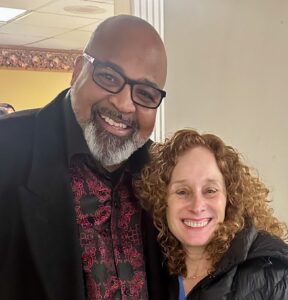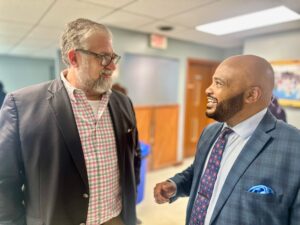
(L-R): Matt Golden, director of the Jewish Community Relations Council; Pastor Vincent E. James Sr. of Elim Baptist Church
By Andrew Adler
Community Editor
Ben Freed had barely settled into his role as Keneseth Israel Congregation’s new rabbi last spring when the email landed in his inbox. It had what seemed a routine request: Would he mention to his congregants that the Louisville Orchestra was about to perform a program comprising works by Black and Jewish composers?
Great idea, but there was a snag: the concert would take place on a Saturday evening before the end of Shabbat.
So “I sent an email back and said, ‘I think it’s wonderful,’” Rabbi Freed recalls. “You’re doing this exploration of Black and Jewish music, but frankly, I’m disappointed that I’m not able to go as an observant Jew and therefore I can’t, you know, promote it to my congregation. And to the orchestra’s great credit, when they heard that they sent me an email back and said, ‘You know, we messed up, and we’re sorry. Let’s connect you with our executive director, and you can talk about how to do better moving forward.’ ”
That casual suggestion grew into a major collaboration: Journeys of Faith, embracing an imperative to build, nurture and broaden relationships between Jewish and Black constituencies.
With the help of the Jewish Community Relations Council and key support from the Louisville-based Jewish Heritage Fund, four area synagogues paired with four historically Black churches, with participants getting to know one another as they study sacred and secular texts. The project culminates on March 11, when those participants listen as Music Director Teddy Abrams leads the orchestra in a program built around Atlanta-based composer Joel Thompson’s “To Awaken the Sleeper” (with narrated words by James Baldwin), and Leonard Bernstein’s Symphony No. 2, which carries the provocative title, “The Age of Anxiety.”
“It seemed like such a tremendously rich area of exploration,” Abrams says, “and an adventurous way to put a lens on our programming, especially in response to everything that’s happened about Breonna Taylor, policing and equity.”
With Freed as the impetus, it fell to JCRC director Matt Golden to turn the suggestion into pragmatic reality. He paired Keneseth with Pastor Corrie Shull of Burnette Avenue Baptist Church, Cantor David Lipp of Adath Jeshurun with Pastor Wanda Mitchell-Smith from First Gethsemane Church, Cantor Lauren Adesnik of The Temple with Pastor Vincent E. James Sr. from Elam Baptist Church, and Rabbi Beth Jacowitz Chottiner of Temple Shalom with Bishop Steven Kelsey from Spirit Filled New Life Ministries.
“I just sort of jumped in and said, ‘Well, here’s what we’re going to do,’” Golden explains. “I don’t think there’s any one view of the Black community, and I don’t think there’s any one view of the Jewish community. It’s really these religious institutions that have the vision, gravitas and space to talk about the issues the community faces.”
Golden knew several of the faith leaders from his time in city government. “For example, Beth Chottiner is very interested in social justice issues surrounding violence in the community, and so is Bishop Kelsey, who leads faith-based initiatives for the city to prevent gun violence.”
“We were in the trenches together,” Pastor James recalled. “I was working in the city as chief of community building; Matt was chief of public services. We used to have a bet on who would leave first on Friday.”
“Some of them were interested from the beginning,” Golden says. “Some were more trepidatious – they had to understand what this was about. But there’s familiar territory: People in all these groups study the Bible in their own homes, synagogues and churches. So it became very natural to say, ‘We just want you to study these texts together.’”
Which is why on a recent Sunday evening, 17 congregants from Temple Shalom made their way to the Spirit Filled New Life Ministries’ church on Hazelwood Avenue. Hospitality was in full force – church members had prepared dinner – and after everyone had taken turns introducing themselves, half the participants remained with Chottiner, with Kelsey and the other half strolling a short distance to an adjacent meeting space.
“We’re here today to bridge some gaps,” Kelsey, a gregarious bear of a man, told his group. “So we’re going to see that” Jewish and Black cultures “have always been the same.”
His audience, Jewish and Christian alike, listened intently as they sat on a circle of folding chairs. Kelsey continued:
“The reason why people discriminate against” Jews and Blacks “is the fact that we are humble,” he said. “So they have learned how to put systems in place to keep us from moving forward. But they don’t teach us about our history,” how Jews and Black Americans “joined together to bring about the civil rights movement.”
From there it was on to a discussion of Martin Luther King Jr.’s celebrated 1962 speech given at Cornell College in Mount Vernon, Iowa.
“I am convinced that men hate each other because they fear each other. They fear each other because they don’t know each other, and they don’t know each other because they don’t communicate with each other, and they don’t communicate with each other because they are separated from each other.”
The historic ties between Blacks and Jews in the 1960s – Rabbi Abraham Joshua Heschel marched in the company of King – testified to shared moral and spiritual values. It was Jews, Kelsey reminded his listeners, “that saw white water fountains and colored water fountains was not good for anybody.” While white store owners often didn’t allow Black customers from trying on clothes, Jewish proprietors welcomed those same customers with no such prohibitions.
At this juncture Kelsey asked one of Temple Shalom’s attendees – David Kaplan, Mayor Craig Greenberg’s chief of staff — what King was getting at when he spoke about the dynamic of hate.
“What that means to me,” Kaplan replied, “is that you see it all the time – the hostility between law enforcement and the people they’re trying to police. There’s fear that’s just unwarranted, because of lack of understanding about communication.”
Soon it was time for Chottiner to lead the discussion. As her launching point, she played a recording of the address given by Rabbi Joachim Prinz during the 1963 March on Washington – words largely forgotten because King’s they were followed immediately by King’s “I Have a Dream” speech.
In one highly personal moment, Chottiner told of a time in her life “when I lived in Atlanta, and I had to go to a place outside of Atlanta, Smyrna. I happened to be wearing a Jewish star that day, and I tucked it in because I did not feel safe. And now, with what’s happening with the rise in antisemitism, I think twice – like, will I wear a Jewish star or not, because it makes me afraid?”
The Journeys of Faith format has each pairing exchange visits, so a New Life contingent will travel to Temple Shalom on March 5. Meanwhile, the orchestra has been sending small ensembles to give brief pre-discussion concerts at various faith venues.
A week after the New Life/Temple Shalom event, Congregation Adath Jeshurun hosted the Louisville Orchestra Brass Quintet and guests from First Gethsemane. The principal facilitator was AJ Cantor David Lipp. “I’ve immersed myself in two of Bernstein’s three symphonies (the orchestra will perform his Symphony No. 3, Kaddish,” on its March 4 program),” Lipp says, “and it’s been fascinating. I’m kind of shocked at how little I knew. I had no idea he wrote a symphony called ‘The Age of Anxiety’ (written in 1946-7 and based on W.H. Auden’s book-length poem of the same name).
Later that afternoon, Lipp guided attendees through a series of Jewish biblical and related texts.
“If there is anxiety in a man’s mind let him quash it,” Proverbs 12:25 exhorted, “And turn it into a good word.” Then the Babylonian Talmud weighed in, with one rabbi declaring that “he should forcefully push it out of his mind,” with another rabbi arguing the passage “means he should tell others his concerns, which will lower his anxiety.”
To be sure, anxiousness was not a defining dynamic of this gathering. Cooperation and generosity of spirit were.
“I was sharing with Cantor Lipp the other day about AFSCME – the American Federation of State, County and Municipal Employees – I’m a retiree,” said First Gethsemane’s Mitchell-Smith, “and that it was the Jewish and Catholic faiths that were able to get a contract negotiated for the sanitation workers of Memphis, Tenn.,” where King marched alongside striking workers, shortly before being assassinated at the nearby Lorraine Motel on April 4, 1968.
Much progress has been made since that day, as has much tragedy. The names George Floyd, Breonna Taylor, and most recently, Tyre Nichols, loom large in the collective consciousness of American life. Antisemitic incidents are on the rise, and horrific events such as the 2018 Tree of Life Synagogue massacre in Pittsburgh are stark reminders that hate remains a potent adversary.
Amid all this, initiatives like Journey of Faith offer at least a respite, and at most a path toward gaining real, enduring traction between communities bound up by history and common purpose.
“This is what I hope will be transformative experience for our synagogues and our churches,” Freed says, adding a caveat “that a transformative experience doesn’t happen just because we get together twice and go see a concert. The real work will begin afterward. But I think this is fertile ground on which to plant the seeds of a new relationship.”




